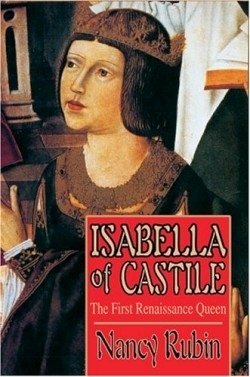Isabella of Castile
First published in 1992 as one of many books commemorating the five-hundredth anniversary of Columbus’s transatlantic exploration, the re-release of this biography demonstrates that while Americans owe Queen Isabella a tremendous debt, she considered her decision to fund his journey minor.
Isabella’s life (1441-1504) was filled with political and religious intrigues. As queen, she wanted to maintain the monarchy for her five children, serve as a helpmeet to her husband King Ferdinand, and preserve Spain for the Catholic Church. During her time, marriages amongst the upper classes were made for political rather than romantic reasons. Isabella was married to Ferdinand with the hope of producing immediate male offspring and to cement political alliances. Both Catholics, they had their marriage negotiated by the archbishop. Though their union was initially assumed to be political, there is evidence that their common ambition and sense of duty forged a bond of love and respect.
Early in their marriage, Isabella practiced the womanly arts she’d been taught by the nuns. At seventeen, she believed in the traditions of courtly love and the precepts of the Catholic Church. While she privately pursued power for her husband’s dynasty, she also “accepted the biblical notion that the man was natural lord over the woman,” according to the author.
During their stewardship over Spain, the country was in a nonstop succession of wars, many of which were motivated by religious intolerance (Queen Isabella believed that Catholicism was the one truth faith). During her reign, Jews were evicted from the country, dissenters were burned at the stake, and the Inquisition against Muslims and Jews reached its zenith. With a remarkable intellect, as monarch she promoted the arts, supported the “new” learning Renaissance, and funded explorations.
Rubin is an author and journalist who specializes in women and social history; she has also published a biography of Marjorie Merriweather Post, as well as nonfiction titles about women’s issues. In her research, preparatory to writing this biography, Rubin learned Medieval Spanish and spent time working in several archives in Castile. Her attention to detail adds texture and depth to the book, for which she won the American Society of Authors “Author of the Year” Award.
Isabella of Castile renders a balanced sense of court life, the contradictory forces within both the Catholic Church and the European ruling families, and the influence of Isabella.
Reviewed by
Pam Kingsbury
Disclosure: This article is not an endorsement, but a review. The publisher of this book provided free copies of the book to have their book reviewed by a professional reviewer. No fee was paid by the publisher for this review. Foreword Reviews only recommends books that we love. Foreword Magazine, Inc. is disclosing this in accordance with the Federal Trade Commission’s 16 CFR, Part 255.

